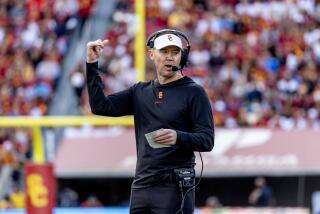USC questioned whether Lori Loughlin’s daughters were really athletes a year before admissions scandal
In March 2018, several high schools contacted USC, puzzled that certain students were being admitted as recruited athletes. Los Angeles’ Marymount High School, attended by actress Lori Loughlin’s two daughters, “doesn’t think either of the students are serious crew participants,” a USC employee wrote in an email.
Donna Heinel, the third-ranking administrator in USC’s athletic department, was asked to investigate. She reported back the next day: Loughlin’s younger daughter rowed for a “competitive” club and USC’s coach “thinks she has talent,” she wrote.
A year later, Heinel was arrested and charged with arranging dozens of deals to sneak unqualified students into USC, including Loughlin’s daughters. Prosecutors disclosed emails on Tuesday showing Heinel was tasked with investigating the very fraud she allegedly perpetrated.
The messages were filed in federal court along with another 480 pages of emails, transcripts of recorded calls and financial and academic records that significantly widen the aperture on William “Rick” Singer’s college admissions scam.
An attorney for Heinel and a spokesman for USC didn’t immediately respond to requests for comment. Heinel has pleaded not guilty to conspiracy to commit racketeering, fraud and bribery.
In court papers filed on Tuesday, Eric S. Rosen, an assistant U.S. attorney, addressed complaints by defense attorneys, who had argued Rosen and his colleagues were withholding evidence favorable to their clients. Rosen took aim at an argument floated by Loughlin and her husband, Mossimo Giannulli, that the two believed their $500,000 payment to Singer would go toward legitimate donations to USC.
The couple “specifically rejected this ‘legitimate’ approach,” Rosen wrote, pointing to an email exchange between Giannulli and an official in USC’s development office.
With the fashion designer’s older daughter applying in 2016, the official, whose name is redacted in the documents, offered to “flag” her application and asked “if I can be at all helpful in setting up a 1:1 opportunity for her, customized tour of campus for the family, and/or classroom visit.”
Giannulli was already conspiring with Singer to pass off the girl as an elite coxswain, prosecutors say. Singer asked Giannulli in an email for “a picture with her on an ERG [rowing machine] in workout clothes like a real athlete.”
Six days before the USC official’s email, Giannulli fielded one from Singer: “Got it all. Profile is being made as a coxswain and USC is awaiting my packet with the transcript, test scores and profile.”
Giannulli told the development official: “Thanks so much, I think we are squared away.” He forwarded the email thread to his wife that night, adding, “The nicest I’ve been at blowing off somebody.”
A month later, Heinel presented their daughter as a recruited coxswain to a USC admissions committee, which approved the girl for admission “based on falsified athletic credentials,” prosecutors allege. The couple wrote a $50,000 check to a USC account that Heinel controlled and wired Singer $200,000, prosecutors say. They repeated the fraud a year later to get their younger daughter into USC, according to prosecutors.
Loughlin and Giannulli have pleaded not guilty to conspiracy to commit fraud, money laundering and bribery.
Rosen wrote that no USC officials interviewed by his office knew payments from Singer’s clients “were a quid pro quo” for admission, apart from those who have been charged with crimes. The government has no evidence that anyone outside of the school’s athletic department knew of Singer’s corrupt deals, Rosen said. Nor, he added, has his team seen evidence that anyone who supervised Heinel or other charged coaches was aware of the fraud.
But “to be sure,” Rosen wrote, “others at USC understood that Singer existed.” He attached to his filing an email Heinel received in 2015 from Tim Brunold, the school’s dean of admissions. The subject line: “Rick Singer.”
“I don’t know anything about this Singer guy,” Brunold told Heinel, “except to steer clear!”
Three years later, Heinel was asked to investigate applications submitted by three students, one of them Giannulli’s younger daughter. Notified the student had been flagged as a rowing recruit, her high school counselor had told a USC admissions officer a year earlier, “I had no knowledge of [her] involvement in crew and based on what I knew of her doubted she was involved in crew,” according to a record of the conversation that prosecutors filed in court.
In March 2018, a USC official emailed Heinel the names of three students “whose high schools were quite surprised to hear they were being admitted as athletic recruits.” Most of the names are redacted; Gianulli’s was not.
Heinel wrote back the following day. Giannulli’s younger daughter was on a list of prospects the crew coach “inherited” from his predecessor; he was “welcoming” her to walk onto the team and “earn a spot,” she wrote. Another student Heinel was asked to investigate, whose name wasn’t disclosed, had “great baseball IQ,” “a good bat” and a family with ties to “a donor that gave 1 million dollars to the baseball program,” she said.
More to Read
Sign up for Essential California
The most important California stories and recommendations in your inbox every morning.
You may occasionally receive promotional content from the Los Angeles Times.










